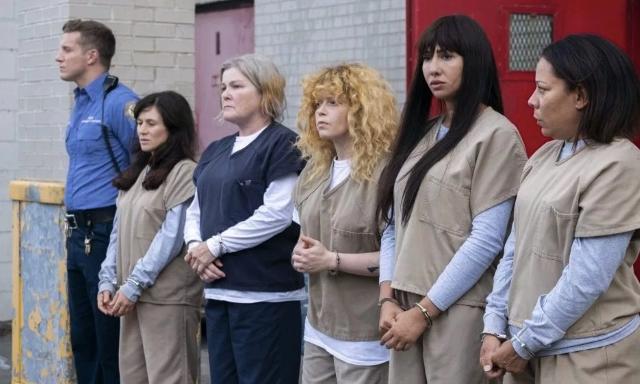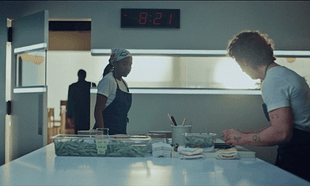If you followed 'Orange Is The New Black' from its opening season right through to this week's finale, you'll know it's been a show that has had some problems.
For one, the fact that it was initially supposed to be a short enough sentence for central character Piper Chapman (Taylor Schilling) had to be drawn out to seven seasons. Naturally enough, there were some ways of weaving this into a longer sentence. One entire season was set within a week of a prison riot, for example. Yet, what 'Orange Is The New Black' has always understood and done well is that it recognises that Piper Chapman's story is by far the least interesting of the characters.
She's the audience surrogate, sure, but what's kept 'Orange Is The New Black' engaging for so long is that the diverse cast around her have been far more interesting. In fact, later seasons pretty much sidelined Piper altogether to allow them to come to the fore - and it's been the better for it. Yet, for all of this, there's only so much you can do inside a prison before it becomes the same thing, day in and day out.
Yet, in the final season, 'Orange Is The New Black' has pulled off a masterstroke and made itself relevant again. The final scenes of last season saw Blanca (Laura Flores) being detained by ICE after she initially believed she was being set free on early release, whereas Piper was picked up by her brother and returned home. It crystallised the injustice that's at heart of America in general; that one people who look and speak a certain way get certain advantages, and the others don't.
The story picks up pretty much right after, with Piper now trying to readjust to life on the outside but within the confines of her early release. She has to lie about her prison sentence to strangers, and when her strict WASP-y father eventually agrees to find her a job, it's done with the kind of passive-aggression that WASP-y types do so well. On the flipside, Blanca is now being kept in an ICE facility - that just so happens to be in Litchfield - and is trying to navigate the murky legal system to stay in the country.
Like so much of 'Orange Is The New Black' has done previously, it never judges any of the characters for their mistakes and comes to the conclusion that people are merely trying to survive and doing what they can with what they've got. There's a truly touching flashback moment where Blanca, after receiving her Green Card and is having a party to celebrate, talks about watching 'Perfect Strangers' as a child and comparing her own experience as an immigrant to Balki's. It's this level of honest humanity that makes 'Orange Is The New Black' so devastating without even trying, and what's more, it never feels like it's being exploitative of these situations. It doesn't need to go for huge emotional climaxes when it can be done with small, genuine moments that have the same impact, if not more.
In between the ICE story arc, there's other stories that delve into the relationships and characters that have formed over the seven seasons. Kate Mulgrew's hardened veteran, Red, is slowly beginning to lose her grip, with the long-term effects of prison beginning to deteriorate her mind and body. Taystee, played by Danielle Brooks, has to reckon with the idea of life behind bars and the crushing effect that has on someone's mental health. Doggett, played by Taryn Manning, tries to go through adult learning and learns of herself in the process. Caputo and Figueroa, played by Nick Sandow and Alysia Reiner, are trying to navigate trying for a baby later in life. The continuing saga of Litchfield being run by for a for-profit company slithers on.
That 'Orange Is The New Black' seamlessly weaves all these stories together in each episode, without ever losing its way, is a testament to how it's one of Netflix's best original shows. Considering how the likes of 'House of Cards' lost the run of itself so quickly, and how prestige shows can often outlive their usefulness, 'Orange Is The New Black' corrects itself in the final season and walks free in the end.









































































